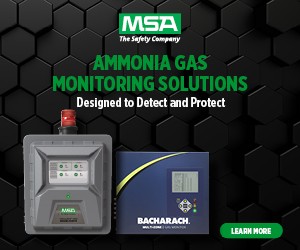President’s Message by Gary Schrift

Business models have changed and shifted. Everything from how we work to how we get together to how the pandemic has pushed our technology ahead – sometimes overnight – has yielded a new status quo. These lessons, changes, challenges, and breakthroughs will be with us as we write the next chapter for natural refrigerants.
And sometimes, the change from “old normal” to “new normal” happens so gradually, it’s surprising to look back suddenly and see how far we’ve come. That’s the case in our industry, specifically when it comes to codes and standards.
I’d like to take some time in this month’s column to recognize an announcement made by Jeff Shapiro, IIAR’s Code Consultant, at our recently concluded Natural Refrigeration Conference and Expo.
After years of work, it is more than likely that all code bodies will now refer to IIAR for ammonia refrigeration requirements by 2024. IIAR has made significant progress towards this goal over the past 20 years, but there was one outlier—the International Fire Code. However, the IFC’s technical committee has approved a proposal for the 2024 edition of its model code, deferring all matters related to ammonia refrigeration to IIAR (read more on page 12 of this issue).
The inclusion of the International Fire Code in IIAR’s long roster of code bodies which refer to IIAR for ammonia refrigeration requirements may seem like an incremental change, but it’s the culmination of a decades-long effort. Suddenly, the “new normal” is here.
As of the 2021 model codes, the International Mechanical Code (IMC), ASHRAE-15, the Uniform Mechanical Code (UMC), and the National Fire Protection Association (NFPA), all agreed to defer to IIAR-2 and other IIAR standards as the entire basis of regulating ammonia, Jeff said while speaking during IIAR’s annual meeting.
He added that “about a month ago the technical committee for IFC approved a proposal to eliminate the mechanical refrigeration requirements in the IFC for ammonia systems and to defer to IIAR.”
“Beginning in 2024, if our IFC [proposal] is successful, the only other document that will regulate ammonia refrigeration safety besides IIAR standards and design is building codes, and building codes apply to all buildings. That isn’t unique to ammonia refrigeration.”
The IFC change is subject to public comments before final approval. The fire code was the last of the model codes to defer to IIAR for ammonia-related issues. You can read more about the long history of this effort in this Condenser issue. So I’d like to focus on how significant it is that such a monumental undertaking was completed – all thanks to the sustained hard work and effort of IIAR’s dedicated membership. Without the years of work put in by IIAR’s code committee, volunteers, members of the board of directors, and especially Jeff Shapiro, we would not be looking forward to a future that will include a much greater degree of influence in our regulatory destiny, than we started with.
As we all look forward to resuming some of our “old normal” activities and traditions, especially our in-person annual conference attendance, I’d like to urge everyone to take a fresh look at IIAR and get involved in defining what’s next for all of us.
The best way to do that is to stay informed and find big and little ways to dedicate your time and effort to the cause of natural refrigerants. IIAR runs on volunteer excellence, and there are no shortages of tasks to complete, conversations to have, and new issues to examine.
If you have an interest in any of the activities IIAR is involved in, consider joining a committee, make advance plans to renew your membership, contribute a technical paper or Condenser article, or simply show up with your ideas and enthusiasm. We can’t wait to see you in 2022!











